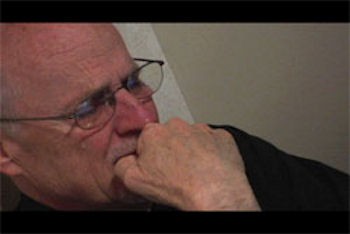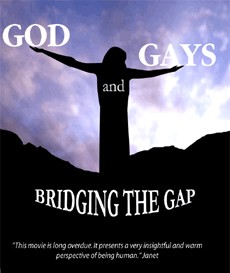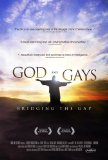| Reviews & Columns |
|
Reviews DVD TV on DVD Blu-ray 4K UHD International DVDs In Theaters Reviews by Studio Video Games Features Collector Series DVDs Easter Egg Database Interviews DVD Talk Radio Feature Articles Columns Anime Talk DVD Savant Horror DVDs The M.O.D. Squad Art House HD Talk Silent DVD
|
DVD Talk Forum |
|
|
| Resources |
|
DVD Price Search Customer Service #'s RCE Info Links |
|
Columns
|
|
|
God and Gays: Bridging the Gap

The Movie
The more I watch documentaries focusing on how religion has in some way negatively impacted the lives of many gay people, the more I realize how lucky I've been. While I always faced fear of rejection while growing up--a near-paralyzing evil that had a hold on me until my mid-20s-- I never once felt ashamed of the person I was, even if it took me what seemed like forever to tell everyone. I went to church as a child, but never really felt its power like many others did. But I never felt fearful while I was there, and my anxiety about coming out to my family was based more on my own paranoia than anything they did to make me uncomfortable. A lot of that has to do with the luck of the draw--not only was I raised well, I grew up in a large metropolitan area with a large gay presence, which certainly made the transition easier.
As for religion, I believe in a higher power, but I've never attended church on a regular basis as an adult. That tidbit is probably important for this review, and while watching God and Gays, I frequently asked myself, "What if...?" What if I grew up in a less tolerant city or family? What if my coming out process wasn't as smooth and free of conflict? What if I had a much deeper religious conviction that made reconciling my faith and my sexuality so tortuous? Filmmakers Kim Clark and Luane Beck explore those struggles in this effort, which talks to a variety of people as they share their difficult journeys.
All of the subjects have a strong religious background and relationship with God, something that has been severely tested at some point in their lives. The opening section has them talking about discovering their sexuality, coming out and being rejected by those close to them. "In the process of 'becoming' straight or whatever I was, I just shut down inside. I had no feelings or attraction to women," says Darlene, a former Exodus leader. "I (was just) non-sexual, which I equated with then to being straight; I was too busy to feel."
She is one of many participants who have been affected by the suicide of a loved one, a recurring theme in many of the participants' lives. Hearing these tragic tales and inner conflicts--including Karen, who grew up in a fundamentalist Pentecostal church and has same-sex attraction but doesn't act upon it--is sad and frustrating (some say they still don't know whether you're born gay, which may be heartbreaking to some viewers). Their beliefs, doubts and sense of self usually comes from their family, who raised them to "parrot" what they were told.
Rev. Deborah Johnson, co-founder of Inner Light Ministries, gets the most screen time and eloquently anchors the film's arguments. Her own struggle to self acceptance and love--a challenge made more difficult after being told homosexuals were equal to sinners, criminals and psychopaths--is common among many. After being made to feel invisible and having a sense of "nobody-ness", she embarked on a spiritual journey to learn from God--and realized she didn't feel condemned or that she was damaged goods. "I don't believe that if there's any way, shape and form that there are people who are 'naturally' gay or 'naturally' not heterosexual, I don't believe that there is a God that has condemned them to loneliness, that there is a God that has condemned them to isolationism."
The film then shifts into the struggle they face finding love and acceptance from God, who many have been told sees them as an abomination. "When you're in the closet, you can't really see anything. You think you know exactly how people are going to react, and I was exactly wrong," says actor/comedian Jason Stuart. He has been cut off from his sister and her family--a conflict that has turned him away from organized religion. He shares some of the film's more memorable stories, and tries to inject a little humor into the very serious material, which successfully breaks up the film's somber tone ("Whenever I hear someone say that, I always think, 'Gay lifestyle? Oh, I'm in a disco, dancing!' I mean, they have a life, we have a lifestyle.").
Along the way, we also meet seminary student Laura Engelken, who became skeptical of the Bible when she saw how it was being used. "It is a cultural document that was put together by lots of different folks for lots of different reasons. It doesn't mean that it doesn't have value, but how people interpret it and use it is often more about them than it is about God." Rev. Johnson adds that she doesn't have objections to people having their own interpretations, but thinks it's dangerous to change the text (the word "homosexual" wasn't added until 1946). "The people who wrote the Bible are still rich in trying to discover its meaning. They knew you had to study it every day because you were going to get something new every time you read it. It's not, 'This is it.'"
The segment exploring the Bible--including the verses in question and how people interpret them--is one of the film's strongest segments, and I wish it was a bit longer (it is expanded upon in the bonus features). For someone like me (who doesn't have vast knowledge of it), it's fascinating to learn about its history and various versions--and how language has played a role in those different versions and interpretations. "The Bible is being used to put forth this superiority of heterosexuals in the same way that the Bible was used to put forth the superiority of the white race," notes Johnson, who continues with some fascinating theories and stories (including how the work was treated in Greek and Roman culture, and how gender assumptions have also contributed to a fear of homosexuality).
Adds Soulforce co-founder Mel White of six commonly misused Bible verses: "They're taken literally rather than understood by their historical or linguistic context. They're just used to support these ancient prejudices." White also appeared in Sole Journey, a similar documentary that has a lot in common with God and Gays--as does Questioning Faith (although I never tire of hearing White share stories about his past, including a friendship with Jerry Falwell). For those that have seen both of those other works, this film probably won't have quite the same effect and power. All three mine similar territory, and God and Gays doesn't do anything drastically different to stand out (although some of the stories here just as moving and emotional).
But while the documentary has many powerful stories, it's not ideally structured--there's a little too much jumping back and forth among contributors, whose stories would have more impact if they weren't interrupted as much. The topics and transitions don't flow as well as they could, and the filmmakers actually insert themselves into the proceedings too much, which proves distracting. In addition to director Beck being present for many of the interviews (nodding along, making a few comments and asking generic questions like "Why do you feel that people need to feel superior?"), she appears with producer Clark in awkward interludes with the two walking by the beach in somewhat generic, pseudo-scripted conversation that forces segue ways:
"So what did you think about when Revered Deborah brought up the kids?"
"I thought it was great, because it's true."
That exchange is followed by a conversation about incorrect assumptions made by Clark's congregation: "It all goes back to the Bible..." she says as the two pause for effect and we're led to the next segment.
The filmmakers also don't do themselves any favors behind the camera--static shots are interspersed with a busier camera that zooms in and out too much in an apparent attempt to be more "artistic" (like a close-up on the interviewer's hand or the subject's face). But the words are powerful enough, and it's just another distraction (ditto some of music that creeps in during more poignant stories, although we learn that one segment was composed by Anna, whose story proves to be unforgettable). The final quarter of the film also spends too much time in "feel good" mode, doling out advice for troubled kids and confused family members when it could spend more time on the meatier topics. You also don't get any dissenting voices or an exploration of some of the opposing arguments.
But it's all well-intended, and for gay people struggling to come out--and for friends and family members struggling to accept them but open-minded enough to watch the whole film--God and Gays will be inspirational. In addition to Rev. Johnson, the film is at its most powerful when it talks to Mary Lou Wallner, the TEACH Ministries co-founder who regrets how she handled her daughter's coming out process--a wound that was never healed after her daughter cut of all ties and later died. Her story is the most gut-wrenching and ultimately encouraging, as Wallner's transformation (one that she admits is still a struggle) provides hope for progress.
"I can tell you honestly--and I'm not proud of this--but when she first came out to me, I wished she were dead. I would rather she be dead than gay, and I look back on those feelings and thoughts, and that was pretty awful...but that's how deeply ingrained it was in me of how sinful it was," she shares, adding that her daughter had to battle her own inner homophobia, a common problem with gay people of any religious background. "I was so closed...I had not one crack in my soul of openness, of even talking about it with her. I think it was because I wasn't ready to know anything different."
While God and Gays might not be as cohesive and organized as it could be, stories like Wallner's are impossible to forget. How can you argue with such honesty and emotion? Regardless of its entertainment strength as a documentary, the work is certain to have a profound, positive effect on a group of people that needs it. For that alone, it deserves praise.

The DVD
Video:
This is a low-budget documentary and it looks like it, with little detail or sharpness. While the quality is average at best, the powerful stories wouldn't be any more effective if the presentation were pristine. But it's still disappointing that the widescreen image is not anamorphic.
Audio:
The 2.0 track is more than sufficient for this dialogue-driven effort.
Extras:
The audio commentary with producer Kim Clark and director Luane Beck (struggling with a cough) is a nice listen for fans of the film, as they spend a lot of time expanding on the people involved and some of the things we see (which would have been better to include in the actual film to clear up any confusion, like the setup for the opening scene/event). I most enjoyed hearing an update on Mel White and his visits to Falwell's church in Lynchburg, Virginia. They also talk about some of the artistic choices (like the lighting and backdrops used for the theologians), and share some interesting facts along the way. Both also acknowledge the importance that Jason Stuart had in injecting some humor into the documentary.
Up next are a few interview segments with some recurring and new participants, including White and Rev. Deborah Johnson--although I can't tell you too much about them, because the disc had technical glitches on them that resulted in multiple interruptions (hopefully this was just a random glitch; it also prevented me from getting screen captures). The Politics of Humanity (6:45) seems to focus on controversial issues where the government meets religion; while More on the Bible (11:03) is a self-explanatory featurette that expands on some of the scriptures and resultant controversies (this would have been a strong inclusion in the feature).
I was able to play the Special Message from Peggy Campolo (3:50) in full. The Christian advocate for GLBT people shares some thoughts on the issues at the Soulforce event that opens the documentary. She gets the sense many people who work in the church "get it" and can "connect the dots" when it comes to accepting homosexuals and not using the Bible the wrong way--but that most of them are too afraid to speak out about it. The film's theatrical trailer and trailers for other Indican Pictures releases completes the package. The filmmakers encourage people to check out the additional content and resources on the film's website.
Final Thoughts:
It's hard to deny the moving stories shared by the people in this documentary, which explores the struggles gay people face in reconciling their homosexuality with their religion. Through their powerful words--and the words of at least one "transformed" family member--hope is born, and this work will undoubtedly have a positive impact on a group that needs encouragement. As a documentary, God and Gays isn't quite as cohesive and complete as it could be, and jumps around a little too much for my liking--with a few artistic missteps by the filmmakers also detracting from the overall impact. And if you've seen similar efforts like Sole Journey, this work won't be as "fresh" as it could be. I'm glad I watched it, but I'm not sure I'd watch it again--although it's a must-watch for those facing the same struggle. Rent It.
|
| Popular Reviews |
| Sponsored Links |
|
|
| Sponsored Links |
|
|
| Release List | Reviews | Shop | Newsletter | Forum | DVD Giveaways | Blu-Ray | Advertise |
|
Copyright 2024 DVDTalk.com All Rights Reserved. Legal Info, Privacy Policy, Terms of Use,
Manage Preferences,
Your Privacy Choices | |||||||













